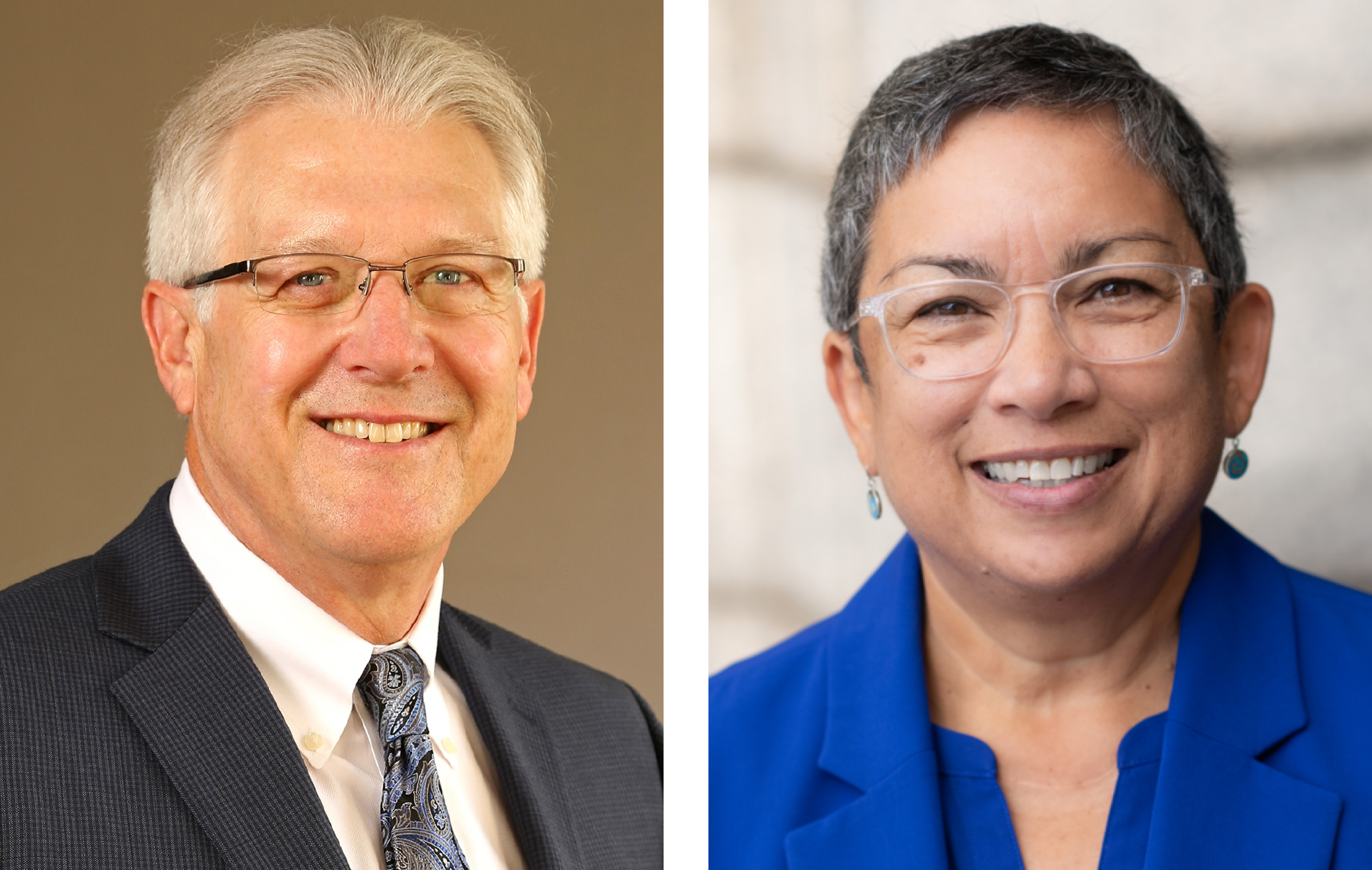
Bill McCarthy and Bernie Burnham
Bill McCarthy and Bernie Burnham

Share
The Minnesota AFL-CIO General Board today elected Bernie Burnham as the statewide labor federation’s next president. The former Duluth teacher, who currently serves as Education Minnesota’s vice president, will succeed Bill McCarthy, who plans to retire Feb. 1 after more than six years in the state’s top union office.
The Minnesota AFL-CIO represents over 300,000 union members across the state. The federation supports more than 1,000 affiliate unions in their efforts to build worker power through contract and organizing campaigns, as well as the political process.
As a Pacific-Islander, Burnham is the first person of color elected to an executive office at the Minnesota AFL-CIO, and the second woman elected president. The vote was unanimous.
Burnham became active in the Duluth Federation of Teachers after taking an elementary teaching job 22 years ago and quickly. She served as a steward and member of the union’s racial equity teams, and on the district’s labor-management committee.
“I was a woman of color who took an unconventional route into the teaching profession,” Burnham said. “I didn’t know if I would be accepted, but my new union family embraced me.”
DFT members elected Burnham vice president in 2010 and president in 2013. She successfully ran for vice president of Education Minnesota in 2018.
In campaigning for state AFL-CIO president, Burnham pointed to her experience working in coalition with other unions to boost political activism and to elevate racial justice as an area of focus in the labor movement.
“It’s an honor and privilege to be elected to this office,” she said. “I am committed to continuing the Labor Movement’s fight for a state where everyone earns a fair return on their work, where every child can pursue their dreams and where every family that’s struggling today will get what they need, things like accessible healthcare, modern roads and bridges, safe housing and world-class schools.”
Burnham is co-chair of the Minnesota AFL-CIO Racial and Economic Justice Committee, which has taken a prominent role in the work of the federation during McCarthy’s time in office.
In an interview last week, McCarthy called the May 2020 murder of George Floyd by Minneapolis police officer Derek Chauvin a turning point. “We just couldn’t stand by and not do anything,” McCarthy said.
Within a month, McCarthy had issued statements calling on the president of the Minneapolis police union to resign and affirming the Minnesota AFL-CIO’s commitment to “dismantling systems of oppression” inside and outside the labor movement.
“These are tough, hard issues, and we’ve just got to keep at it,” McCarthy said. “And I know we’ve failed along the way. We’ve made mistakes. But we cannot be a labor movement that’s effective in any way if we’re not working on social and racial justice issues.”
McCarthy’s accomplishments also include overseeing political programs that thwarted a wave of attacks on union rights at the state level. While anti-union lawmakers were passing right to work and repealing prevailing wage in Wisconsin and other Midwest states, pro-union lawmakers in Minnesota were passing the nation’s strongest wage theft protection law.
Minnesota unions were in better position to advocate for emergency protections after the COVID-19 pandemic hit, too. Under McCarthy’s leadership, the Minnesota AFL-CIO pushed Walz to issue an executive order protecting workers who speak up about unsafe conditions, and fought at the Capitol for expanded unemployment and workers comp.
“Thank God for Gov. Walz,” McCarthy said. “Here’s a man who, I think, really understood what the workers were going through, especially our frontline workers. We asked him to do certain things, to create executive orders to support workers – and he agreed.”
McCarthy also pointed to the expanded work of the federation’s nonprofit, the Minnesota Training Partnership, as a focal point of his presidency. The organization has leveraged grant funding to support Minnesota unions and their apprenticeship programs, helping prepare tradespeople, window washers, manufacturing workers and others for family-sustaining jobs.
“The more we’re supporting our affiliates, the bigger they’re going to be able to grow their unions,” McCarthy said.
A longtime member of UNITE HERE Local 17, the hospitality workers’ union, McCarthy first ran for union office 36 years ago, when he was tending bar at Cleo’s Lounge on the 50th floor of the IDS Tower in Minneapolis.
From there, McCarthy’s rise through the labor ranks began. After taking a job as business agent, McCarthy successfully ran for president of Local 17, a title he held for 15 years before being elected president of the Minneapolis Central Labor Council (now known as the Minneapolis Regional Labor Federation) in 2002. He was seated as state president in 2015.
“I feel like I’ve left the organization in a good place,” he said. “We have a strong team, one of the best teams I’ve worked with. Whoever moves into the leadership role is going to have an opportunity to make it better.”
General Board members voted to name McCarthy president-emeritus for his career of service to Minnesota’s labor movement.

